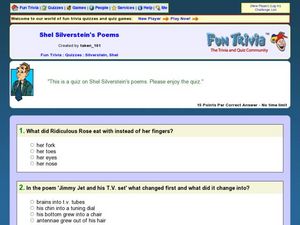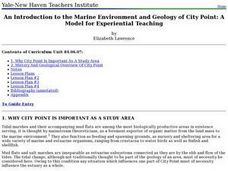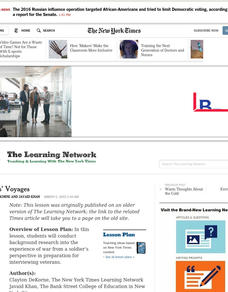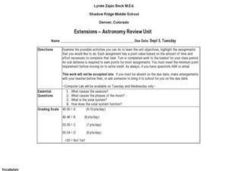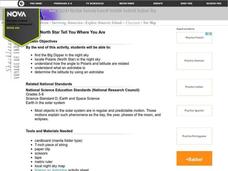Curated OER
Counting Sentences' Words
Explore language arts by completing a worksheet with class. They read the story Owl Moon and discuss the rhythm of the writing and how action verbs are used appropriately. Then complete a writing worksheet which discusses writing...
Curated OER
Spanish Prepositional Pronouns
There are many different types of pronouns used in Spanish for various purposes. If your class has mastered subject pronouns, object pronouns, and reflexive pronouns, perhaps they are ready to learn about prepositional pronouns. You can...
Curated OER
Shel Silverstein's Poems
Check to see that readers recall specific details from Shel Silverstein's poems. The poems appear to be taken from the collection Falling Up. Bring this classic children's author to your class with this resource.
Michigan City Area Schools
Goal Setting for Students
Inspire scholars to shoot for the moon with a presentation that details why goals are important, how to define and identify a goal with four essential questions, the difference between dreams and goals, and tips to achieving a goal.
Curated OER
Exploring the Night Sky: Fall/Winter
Students explain how moon phases occur. They explain three ways that the night sky has been used through history. Students locate some of the constellations in the night sky. They discuss stories and myths surrounding stars.
Curated OER
Predictable Chart/Sentence Building with "Goodnight Moon"
First graders work on a series of modeled reading and writing lessons based on "Goodnight Moon." students work on pages of a predictable class book.
Curated OER
An Introduction to the Marine Environment and Geology of City Point: A Model for Experiential Teaching
Students begin the instructional activity by researching the history of City Point, Connecticut. Using a map, they color areas they were asked to find and discuss why the areas are important to the community. As a class, they are shown...
Scholastic
Lesson One: The Earth, Background and Glossary
How much do you really know about our planet? Middle schoolers build up their prior knowledge about Earth, its placement in the solar system, its composition, and important geological vocabulary with an introductory earth science lesson.
Curated OER
Veterans' Voyages
Introduce your middle and high schoolers to a different perspective on war: that of soldier's. Read Guisseppi Ungaretti's poem "Vigil" to kick-start this lesson. After discussing his perspective, read "The Screaming Eagles Fly to...
Curated OER
Identification of Career Choices
Take some time to have your pupils identify careers that are not traditional for their gender.
Curated OER
Space Science: Adventure is Waiting
These full-color handouts feature two activities. The first is a reading on comets, meteors, and meteoroids. Your space science learners will examine ten phrases and determine which of the three each characterizes. The second activity...
Curated OER
Organizing A Persuasive Speech
Have the class listen to a lecture on persuasive speeches. They practice outlining and detailing the components of a persuasive speech. The lecture outline also includes suggestions for researching a topic or thesis, organizing the...
Curated OER
One Revolution for Robot
Students calculate the revolution and circumference of circles. In this calculus lesson, students derive the formulas for their given shape. They use the d=rt to calculate the distance and rate of travel.
Curated OER
Fact or Hoax? You Decide.
Students analyze the components of debating and practice what they have learned as they conduct a class debate on the lunar landing. Both sides of the issue are researched and presented to the group.
Curated OER
FINDING A RESOLUTION
Students examine detailed Moon and Earth views provided by the NASA-sponsored "World Wind" computer program. They work in groups to create maps of different scales using landmarks of their choice, and challenge their classmates to...
Curated OER
Our Sun and the Four Seasons
Students discover the relationship between the sun and Earth. For this weather lesson, students examine the effect of the sun on the Earth's seasons. Students complete a weather activity using props to simulate the sun and...
Curated OER
Discoveries of Titanic Proportions
Students analyze various statements on the moon. After reading an article, they discuss the findings about a new moon around Saturn. In groups, they re-create a press conference in which the new findings were released to the public. ...
Curated OER
Exploring the Solar System
Students are introduced to the nine planets and countless moons of the solar system. Using the internet, they research one of the planets to determine if a manned mission to the planet would be possible. They share their information...
Curated OER
Extensions - Astronomy Review Unit
Students participate in a review unit in Astronomy using the Layered Curriculum. This allows them to take charge of the type of assessment that is given. The method also allows better differentiation of instruction to occur.
Curated OER
On Jupiter
Students tour Jupiter. In this scenario based lesson, students examine the size of Jupiter and make models of the other planets in the solar system to show how large Jupiter is compared to the other planets.
Curated OER
Let the North Star Tell You Where You Are
Young scholars create an astrolabe and locate the North Star in the night sky. They determine the latitude of the North Star, and calculate an average latitude based on class results.
Curated OER
You Don't Say!!
Fourth graders write and respond to sayings throughout the school year. They define the idioms, illustrate them and compare their meanings with other groups in the class.
Curated OER
Let the North Star Tell You Where You Are
Pupils participate in activities in which they find the Big Dipper and locate the North Star in the night sky, examine the relationship between the angle to Polaris and latitude, and determine latitude by using an astrolabe.
Curated OER
Rocket Science
Students examine what it takes to be a rocket scientist and other related careers. In this rockets activity students use the Internet to do their research.




